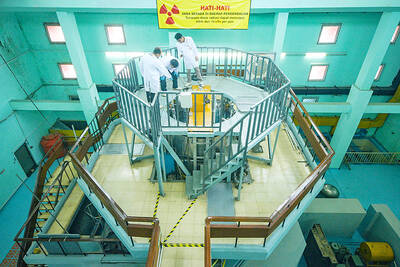Allegations that China was engaged in computer espionage worldwide are “lies” fabricated by people aiming to tarnish the country, the foreign ministry said yesterday.
“Some people outside of China are bent on fabricating lies of so-called Chinese computer spies,” ministry spokesman Qin Gang (秦剛) told journalists.
“Their attempt to tarnish China with lies is doomed to failure,” he said.
Qin had been asked to respond to a report by Canadian researchers that said a shadowy cyber-espionage network based mostly in China had infiltrated government and private computers around the world.
The network, known as GhostNet, infected 1,295 computers in 103 countries and penetrated systems containing sensitive information in top political, economic and media offices, the researchers said in a report.
The report by Information Warfare Monitor was commissioned by the office of the Dalai Lama, the exiled Tibetan spiritual leader, which was alarmed by possible breaches of security in the computer systems of his exiled government.
The 10-month investigation by specialists based at the University of Toronto found the spying was being done from computers based almost exclusively in China.
But researchers said that while the findings were disturbing there was no conclusive evidence the Chinese government was involved, highlighting that China now had the world’s highest number of Internet users.
Qin insisted that the Chinese government has always been opposed to criminal activity on the Internet, including hacking into the computers of others.
He said a “Cold War” attitude towards China persisted overseas, which viewed its rise as a global power as an international threat.
“Outside China there is a ghost called a Cold War ghost and a virus called the China threat,” Qin said.
“People haunted by the Cold War ghost occasionally suffer a seizure caused by the China threat virus,” he said.

Four people jailed in the landmark Hong Kong national security trial of "47 democrats" accused of conspiracy to commit subversion were freed today after more than four years behind bars, the second group to be released in a month. Among those freed was long-time political and LGBTQ activist Jimmy Sham (岑子杰), who also led one of Hong Kong’s largest pro-democracy groups, the Civil Human Rights Front, which disbanded in 2021. "Let me spend some time with my family," Sham said after arriving at his home in the Kowloon district of Jordan. "I don’t know how to plan ahead because, to me, it feels

Poland is set to hold a presidential runoff election today between two candidates offering starkly different visions for the country’s future. The winner would succeed Polish President Andrzej Duda, a conservative who is finishing his second and final term. The outcome would determine whether Poland embraces a nationalist populist trajectory or pivots more fully toward liberal, pro-European policies. An exit poll by Ipsos would be released when polls close today at 9pm local time, with a margin of error of plus or minus 2 percentage points. Final results are expected tomorrow. Whoever wins can be expected to either help or hinder the

North Korea has detained another official over last week’s failed launch of a warship, which damaged the naval destroyer, state media reported yesterday. Pyongyang announced “a serious accident” at Wednesday last week’s launch ceremony, which crushed sections of the bottom of the new destroyer. North Korean leader Kim Jong-un called the mishap a “criminal act caused by absolute carelessness.” Ri Hyong-son, vice department director of the Munitions Industry Department of the Party Central Committee, was summoned and detained on Sunday, the Korean Central News Agency (KCNA) reported. He was “greatly responsible for the occurrence of the serious accident,” it said. Ri is the fourth person

SKEPTICAL: Given the challenges, which include waste disposal and potential domestic opposition, experts warn that the 2032 nuclear timeline is overambitious Indonesia is hoping going nuclear can help it meet soaring energy demand while taming emissions, but faces serious challenges to its goal of a first small modular reactor by 2032. Its first experiment with nuclear energy dates to February 1965, when then-Indonesian president Sukarno inaugurated a test reactor. Sixty years later, Southeast Asia’s largest economy has three research reactors, but no nuclear power plants for electricity. Abundant reserves of polluting coal have so far met the enormous archipelago’s energy needs, but “nuclear will be necessary to constrain the rise of and eventually reduce emissions,” said Philip Andrews-Speed, a senior research fellow at the